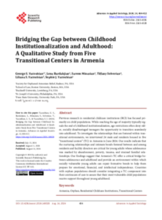Previous research in residential childcare institutions (RCI) has focused primarily on child populations. While reaching the age of majority typically signals the end of childhood institutionalization, age restrictions often deny older, socially disadvantaged teenagers the opportunity to transition seamlessly into adulthood. To investigate the relationships that are fostered within transitional environments, the authors interviewed 24 male and female residents housed in five “transitional centers” (TC) in Armenia in June 2024.
The authors' results indicate that the nurturing relationships and intimate bonds fostered between and among residents and facility directors are critical for young adults whose adolescence was marked by abandonment, poverty, trauma, and strained familial relationships. The authors' findings suggest that Armenia’s TC offer a critical bridge between adolescence and adulthood and provide an environment within which socially vulnerable young adults can repair formative bonds to help them prepare for emotional, financial, and intellectual independence.
Countries with orphan populations should consider integrating a TC component into their continuum of care to assure that their most vulnerable child populations receive support throughout young adulthood.

